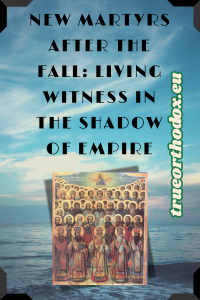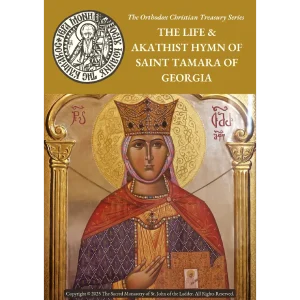Homily 4 on Genesis and Fasting Plus Good Works by St. John Chrysostom

FOURTH HOMILY. God also says, “Let the firmament be made in the midst of the waters; and let him separate the waters from the waters, and so it was. (Gen. I, 6.)
1. The joy of the speaker in seeing the contest and the eagerness of his listeners. He may therefore hope that his instructions will produce abundant fruits, and in advance he will bring back all the honor to the happy efficacy of the fast. 2. It is thus by the force of the spiritual weapons with which the Holy Spirit cloths us that we will overcome the devil, so let us always be provided with these loves. 4. The speaker then proceeds with his explanation of the work of the six days, and after having shown the power of God in the creation of the firmament, he avoids deciding upon the nature of this body, and commits the listeners to be content with what Scripture teaches us. The name of heaven given to the firmament leads him to refute the opinion of the plurality of heavens, and he shows that in the psalms this expression the heavens’ heavens, must be interpreted according to the genius of the Hebrew language which admits the plural for the singular. He extends much to the beauty of the firmament, its vast expanse, and its admirable utility. – 6. 7. 8. This description gives him the subject of various morals, and ends with a strong exhortation to fasting and the love of enemies.
1. Seeing my daily growth, my dear brothers, your help and your eagerness, I am filled with joy, and I continue to thank the Lord for your progress in virtue. For if a good appetite is the sign of good health, the zeal and ardor to hear the holy word is there. infallible mark of a pious soul. That is why Jesus Christ, in the (18) sermon of the mountain, and the enumeration of the Beatitudes, proclaims: Blessed are those who are hungry and thirsting for righteousness, because they will be satiated. (Matthew V, 6.) Who can therefore praise you worthily, you whom the Lord has declared blessed, and who still expect the richest favors? For such is our divine Master. When he finds a soul that carries himself to spiritual goods with a violent desire, and a strong ardor, he enriches him liberally with his graces and his gifts. I also hope he will give me an easier and more abundant word for your benefit and edification. It is for you, and for your spiritual advancement, that I have undertaken this work, so that you may come promptly to the virtues of Christianity. You will then become in the midst of family and friendship the preachers of the holy maxims; and we ourselves will speak to you with more confidence, seeing that our labors are not vain or sterile. Every day the spiritual seed grows in your hearts; and I am much happier than the sower of the Gospel parable. He lost two-thirds of his grain, of which only a part fructified: for he who fell on the high road did not germinate, the one that fell among the thorns was stifled, and the one that, thrown on the stone, remained on the soil surface did not produce any fruit. Here, on the contrary, I hope that the seed of the holy word will be received in a well-prepared land, and that, by the help of grace, it will produce in the hundred and one for one hundred years. and in others, sixty or thirty.
This hope revives my ardor, and excites my zeal; for I know that I do not speak needlessly, and that you lend me an attentive ear, and benevolent dispositions. This language is not in my mouth that of flattery; and he expresses only the joy that yesterday my speech seemed to cause you. I saw you as hanging on my lips, and careful not to lose any of my words. Moreover, your continual applause proved me enough that you received them with real satisfaction. Now a speech that is listened to with pleasure makes a deep impression on us. It is engraved in the most intimate of memory; and this one keeps an imperishable memory of it. Who could therefore and praise you with dignity, and enough to congratulate us on your kind attention? For the wise man said: Happy is he who speaks to men who listen to him! (Eccli XXV, 12.) But I refer all honor to fasting; and if from the first days he produces such fruits in our souls, what will not be, in the course of Holy Forty, his divine efficacy! I ask you then only one thing is to operate your salvation with fear and trembling (Phil II, 12), and to give no access to the enemy of your souls. He foams with rage and fury at the sight of your spiritual riches, and like a roaring lion, he turns around you, seeking someone to devour. (Peter, V, 8.) But if we are on our guard, He will not be able to harm anyone by the grace of God.
2. And indeed the armor with which the Holy Spirit clothed us, as I said to you yesterday, is truly an invincible armor, and if we take care to always cover ourselves with it, none of the features of our enemy will be able to achieve. They will fall back on him without striking us. For divine grace makes us stronger than diamonds, and even, if we wish, completely invulnerable. He who strikes a diamond does not sift it, and only tires and exhausts himself. The courier who resists the spur is flanking himself with blood; and this is what happens to the enemy of our salvation, when we are always covered with the weapons offered by the grace of the Holy Spirit. Their virtue is so great that the devil can not bear its brilliance, and his eyes are dazzled by it. Let us always be armed with these weapons, and we will be able to appear safely in the public square, or in the midst of our friends, and go about our various occupations. But what do I talk about the public square? It is clothed with these weapons that we must come to church, and return to our homes. Moreover, we must not leave them, during all life, neither day nor night; for they are the companions of our journey, and will powerfully help us to reach our destiny. They do not overload the body like material armor, but they make it more ready, more agile and more robust. Only be careful to keep them sharp and brilliant, so that their brilliance dazzle the eyes of our enemies, who use a thousand means to lose us.
But it is enough to speak of this spiritual armor, and it is now advisable to serve you (19) the accustomed feast. So let us return to the account of creation at the place where we left it yesterday, and, under the guidance of Moses, our holy prophet, let us sit down at the table with a good and sound doctrine. Let us see what he wants today to teach us, and let his words listen attentively. For he does not speak of himself, and he is only the organ of the Holy Spirit who through his mouth instructs all men. After telling us about the creation of light, he finished the work of the first day by saying that evening and morning was the first day. Then he added: And God said, Let the firmament be in the midst of the waters, and divide the waters with the waters. Consider here, my brethren, the continuation and the sequence of this doctrine. Moses first revealed to us the creation of heaven and earth; he then taught us that this one was invisible and unformed, and he gives us the reason. It was covered with darkness and water, for there was only water and darkness. Then the light came at the command of the Lord, who separated it from darkness, and who called the light, day, and darkness, night. And now Moses teaches us that just as the Lord, after creating the light, separated him from the darkness, and distinguished them by a special name, he here commands that the waters be divided.
3. But see how great is the divine power; and how far it surpasses all human intelligence! God commands, and suddenly a new element occurs and another withdraws … And God says: that the firmament be made in the midst of the waters, and divide the waters from the waters. What, then, is this word, That the firmament be made? It is almost as if we say in our language: that a wall be established between two elements to serve as their separation. And in order to make us better understand and the prompt obedience of the elements, and the sovereign power of the Lord, Moses immediately adds: And it was done so. God spoke and the work was finished … God made the firmament, and separated the waters that were under the firmament from those that were above the firmament. After that God had created the firmament, he commanded that one half of the waters would remain under the firmament, and the other half would remain suspended above. But what is the firmament? Shall we say that it is condensed water, an extended air, or some other element? No prudent man would dare to affirm it; and it is convenient for us to receive the words of Scripture with humble gratitude, without going beyond the natural limits of our knowledge, nor to deepen mysteries which surpass our intelligence. It is therefore sufficient for us to know and to believe that God, by his word, has created the firmament to separate the waters, and that indeed some are above and others below.
And God called the firmament, heaven. Consider the sequence and sequence of Scripture. Yesterday she spoke thus: Let there be light, and there was light; and God separated the light from the darkness, and he called the light, day. Today she tells us that the firmament was made in the midst of the waters; and just as she has revealed to us the use of light, she teaches us here that of the firmament. Let him separate, says she, the waters from the waters. Finally, as God, after having declared the purpose and functions of light, had given him a name, he also gave one to the firmament. And God called the firmament, heaven, that is, the ethereal vault we see. How can some, you say, argue that many heavens have been created? certainly such a doctrine does not rest on Scripture, it exists only in their imagination. For Moses teaches us only what we have just said; He said to us first, That in the beginning God created heaven and earth, and the earth was invisible, because it was hidden under darkness and water. He then told us about the creation of light; and then the rest of the story led him to tell us about the firmament. And God says, let the firmament be. But what use is it for? This is what Moses is careful to teach us, saying: Let him separate the waters from the waters. Finally, he makes us aware that this same firmament which separated the waters, was called heaven. Who could then, after such a clear and lucid explanation, endure those spirits who speak for themselves, and who, against the authority of Scripture, support the plurality of heaven? but they object that the holy prophet David said in his psalms: Praise the Lord, heavens of heaven. (Ps. CXLVIII, 4.) Well! Do not trouble yourself, my brethren, and do not believe that Scripture ever contradicts itself. On the contrary, recognize its veracity, cling to its doctrine, and close your ears to the cries of error.
4. Listen attentively to what I am about to say to you, and do not be easily shaken by those who give you all their dreams. All the sacred books of the Old Testament were originally composed in Hebrew, no one contradicts it. Now, a few years before the birth of Jesus Christ, King Ptolemy, curious to gather a rich library, wanted to join our Holy Books to all those of various kinds that he had already gathered. This is why he brought some Jews from Jerusalem to translate into Greek, which they did happily. And this is how it came about, by a particular disposition of Providence, that not only those who heard Hebrew, but generally all peoples, were able to profit from our holy books. Is it not equally surprising that this design was conceived by an idolatrous prince, who, far from following the religion of the Jews, observed an altogether opposite worship? But this is how the Lord disposes all things, so that the enemies of truth are the first to break it.
Moreover, this historical digression was necessary to remind you that the Old Testament was not written in Greek, but in Hebrew. Now the most distinguished Hebraists teach us that in this language we always use the word heaven in the plural. The Syrian doctors agree themselves; and so a Hebraist will never say heaven, but heaven. The psalmist was therefore right to say heaven of heavens. And it is not that there are many heavens, for. Moses does not tell you; but it is the genius of the Hebrew language that uses the singular for the plural.
If there were indeed many heavens, the Holy Spirit would have taught us through Moses the existence and the formation. Carefully remember this observation, so that you may close your mouth to all who advance doctrines contrary to the teaching of the Church, and that you remain convinced of the truthfulness of our holy Scriptures. For you do not meet here frequently, and we only give you ample instructions to put you in a position to give reason for your faith. (I Petr III, 115)
But back, please, about us. And God called the firmament, heaven; and he saw that it was good; observe how Moses was proportioned to our weakness. He said light, and God saw that it was good; and now he says of the firmament or heaven, and God saw that he was good. This word gives us a fair idea of its beauty; and is there not reason to be astonished that for so many centuries it has preserved it in all its splendor? It even seems to increase with the course of years. Besides, what is not the splendor of the firmament, since God Himself praised it! When we are presented with some masterpiece of art, a statue, for example, we admire the features, the pose, the delicacy, the proportions, the elegance and the other qualities, but who could celebrate with dignity the covers of God, especially when he rented them himself? Moses, therefore, expresses himself only condescendingly for our weakness; and he repeats the same eulogy after each partial creation, in order to refute in advance those who, in the course of the centuries, were to criticize the divine work, and sharpening their tongue, to ask why the Lord did such and such a creature. He warns them and confounds them with this one word: and God saw that it was good. But when you are told that God lives and praised his work, it must be understood that he praised it in a manner worthy of him. For whoever created the sky knew its beauty before producing it; and yet, because we men are so unintelligent, that we can not understand things differently, he has proportioned the words of Moses to our weakness, and inspired him for our instruction in this imperfect and gross language.
5. When you therefore lift your gaze to heaven and contemplate its magnificence, breadth, and beauty, go back to the Creator, as the Sage says, that the greatness and beauty of the creature may make known and make the Creator visible. (Sag XIX, 5.) Also understand, by the creation of so many different elements, what is the power of your Master. And, indeed, if man would apply his intelligence to the study of each of the wonders of nature, or even if he confined himself to the examination of his own formation, he would need no more to proclaim it. ineffable and (21) immense power of the Lord. But since visible creatures celebrate the greatness and power of the Creator, what will it be when you go up to the invisible creatures? Yes, attain in thought the celestial phalanges, the angels and the archangels, the virtues and the thrones, the dominions and the principalities, the powers, the cherubim and the seraphim, and tell me what genius, and what language could explain the ineffable magnificence of the works of the Lord!
The holy prophet David exclaimed, at the sight of the wonders of creation: O God, how magnificent are your works! you have accomplished everything with wisdom. (Ps. C, 24.) But if this prophet, filled with the Holy Spirit who revealed to him the mysteries of eternal wisdom, uttered those accents of admiration, what shall we say, we who are only ashes and dust! We can only hold our gaze humbly lowered, and our spirit continually delighted with the ineffable goodness of the Lord. And now, after the Psalmist, let’s listen to Blessed Paul. This apostle, brought up in a mortal body to the highest heavens, and who on earth rivaled the angelic spirits with love, traversed the vast expanse of the heavens with great ardor of spirit, stopped on the secrets of divine predestination. They were Jews and Gentiles, some of whom were rejected and others substituted in their place; and as he hesitated, and his sight was troubled, he cried, “O depth of the treasures of the wisdom and knowledge of God! that his judgments are incomprehensible, and his ways impenetrable! (Rom II, 33.)
But here I would willingly question those who want curiously to deepen the generation of the Word, or who try to diminish the dignity of the Holy Spirit, and I would say to them: where does this audacious temerity come from, and who can inspire you extravagant madness? For if Paul, with all his genius and enlightenment, declared that the judgments of the Lord, that is to say the order and the economy of his providence, are impenetrable and incomprehensible, so that no one should allow himself to deepen them; and if he proclaims that his ways, that is to say, his commandments and his precepts, are shirking all our inquiries, how dare you curiously discuss the nature of the only-begotten Son of God, and belittle, as much as he is in you, the dignity of the Holy Spirit?
See, my dear brethren, how unhappy it is not to cling to the true meaning of the holy Scriptures! And indeed, if these heretics had received their divine teaching with a righteous mind and a good heart, they would not have gone astray in their own reasoning, and they would never have fallen into that extreme madness. However, we will not cease to oppose them with the testimonies of our holy books, nor to close our ears to their disastrous doctrines
6. I do not know how the impetuosity of thought and speech has dragged me far from my subject, so I hasten to return to it. And God, said Moses, called the firmament, heaven, and God saw that it was good; and evening and morning was the second day. So when God had given a name to the firmament and approved his work, He finished the second day of creation, and said, And in the evening and in the morning was the second day. Notice here what precision Moses puts in his teaching. He calls evening the end of the day, and morning, the end of the night, then he calls day the duration between one and the other; so that it prevents all error and does not allow us to consider the evening as the end of the day, because we obviously know that the day is composed of evening and morning. Thus one speaks exactly saying that the evening is the disappearance of the light, the morning that of the night, and that the duration of one and the other forms the day. This is what Scripture wanted us to hear by these words: And in the evening and said morning was the second day.
I may have extended myself more than I wanted to, and I let myself be carried away by the Pot of Ideas, as one is sometimes swept away by the current of a river. You are the cause, you who listen to us with so much pleasure. For nothing excites an orator any more and does not fertilize his thought better than the joy and eagerness of his listeners. On the contrary, when they are cold and indifferent, they strike with sterility the most eloquent mouth. That is why I bear this testimony to you, that by the grace of God, even though I am more silent than a stone, you would force me to shake off this lethargy and to dispel that drowsiness, to address to you words that agree and be (22) fit to edify you. But since you are so well disposed and so enlightened of God ,. that you can, according to the thought of the Apostle, instruct others, I conjure you to work for the sanctification of your souls, especially during these days of fasting. And then you will not tire of hearing me treat the same subjects often; for, according to the words of St. Paul, it is not painful to me, and it is to your advantage that I tell you the same things. (Philip III, 1.) Our soul, which is naturally lazy, needs to be incessantly excited; and as we nourish our bodies every day, lest weakness render him incapable of all service, we owe to our soul a spiritual nourishment and a wise direction which causes it to contract the habit of virtue, which makes it victorious of her enemies, and who preserves her from their ambushes.
7. Let us apply each day, then, to exercise the powers of this soul, and let us not neglect the examination of our conscience. Let us keep an exact record of what we receive and what we spend: have we always spoken usefully and aptly? Is it not, on the contrary, that we have escaped some idle speech, and have our conversations been useful or harmful? It is also advisable to prescribe certain rules on this subject, and to set certain limits, so that reflection always precedes us in speech. As for our thought itself, it must be so well directed that it never stops on evil; and if it happens to escape to the outside by a few unsuitable words, we must at once punish them as useless and dangerous. It is also important to hunt by a good thought any bad impression, and to be well convinced that it is not enough, to be saved, to fast until the evening. And indeed the Lord, through the mouth of the prophet, reproved the corrupt Jews: When you fasted the fifth and seventh month for seventy. years, is it for me that you have accomplished this fast? and when you ate and drank, did not you eat and drink? This is what the Lord, the God of hosts says: Judge according to righteousness, and use mercy and clemency to one another; do not oppress the widow, the orphan, the stranger, or the poor, and let no one meditate in his heart on evil against his brother. (Zach VII, 5, 6 … 9, 10.)
But if fasting alone did not serve the Jews who were sitting in the shadow of death and plunged into the darkness of error, because they did not join the practice of good works and they They have not wrested from their hearts the evil thoughts against their brethren, what excuse shall we be able to plead, we who are called to a much more sublime virtue, who ought to forgive our enemies and love them and do them good? What did I say? it is not enough yet we must pray to God for them and recommend their salvation. These sentiments of charity and benevolence towards our enemies will be our principal defense in the day of judgment, and they will obtain for us the remission of our sins. No doubt the love of enemies is a great and difficult precept; but if we consider what a reward is attached to its exact observation, it will appear light to us, however difficult it may be in itself. And indeed, what does the Savior tell us? If you do this, you will be like your Father who is in heaven; and to better express his thought to us, he adds who makes the sun shine on the good and the bad, and makes rain on the just and the unjust. (Matthew V, 45) Thus by loving his enemies, one imitates God as much as human weakness can permit. For just as it makes the sun shine on those who commit evil no less than on the righteous, and it dispenses rain and dew according to the seasons on the fields of the good man and the wicked, you By loving not only those who love you, but your enemies themselves, you show yourself the worthy emulator of the Lord.
You see, then, that the love of enemies raises us to the summit of virtue. But do not stop, my dear brother, to consider only the difficulty of the precept; Reflect also on the honor which will come back to you, and this thought will make you light all that it contains of heavy and painful. Is it not an excellent grace to find, by doing good to one’s enemy, the opportunity to open to God the gates of confidence, and to redeem his sins? But perhaps today do you want to avenge your enemy, and to make him wearily the harm he has done to you? well ! what use in (23) will you withdraw? You will gain nothing; and when you appear before the dreadful tribunal, your judgment will become all the more rigorous, because you will have despised and violated the laws of the supreme judge. Tell me again: If a king imposes, under penalty of death, the love of enemies, all, by the mere fear of punishment, would hasten to observe this law. But what reproaches does not merit the one who, willing to do anything to save a life that nature must inevitably snatch from him, neglects the practice of divine precepts, although it is threatened with a death that will have no end, nor consolation?
8. But I forget myself by speaking thus to Christians who neglect to their benefactors the very duties of gratitude. Who will then be able to guarantee us eternal torments since, far from loving our enemies, we do less than the publicans. If you love, says Jesus Christ, those who love you, what effort do you make? Do not publicans do it too? (Matthew V, 45) But since we are not even going so far, what hope of salvation do we still have? That is why I urge you to be merciful to one another, to repress all thoughts contrary to charity, and to compete with one another only for benevolence and friendship: each one must also, according to the word of the Apostle, believe others above you (Philip II, 3), and not allow yourself to be conquered in good offices. This is how we will surpass each other in charity, and we will testify to those who love us more zeal and affection. Charity is indeed the strongest support, and the greatest consolation of our life; and what distinguishes eminently the man from the brute is that it is up to us, if we wish, to maintain peace and union with our brethren, and to show them the most cordial benevolence. It suffices for us to preserve between ourselves the proper order and good harmony, and to enchain our anger, which is truly a ferocious beast. Let us drag her in spirit at the foot of the formidable tribunal, to bend her to love our enemies either by the hope of the most magnificent rewards, or by the fear of the most frightful torments, if she perseveres in her resentment.
Time is not given for us to lose it in useless and frivolous occupations. But every day, and every hour of the day, we must put the judgments of the Lord before our eyes, so that we may know better what will then give us more confidence, or inspire us with more fear. This practice and these reflections will greatly help us to tame our bad inclinations, and to repress the movements of concupiscence. Let us die in ourselves, as the Apostle speaks, the members of the earthly man, the fornication, the impurity, the dishonest passions, the evil desires, the avarice, the anger, the vain glory and the envy. (Colossians III, 5.) If these evil affections are really dead in us, and if they are no longer felt, we will deserve to receive the fruits of the Holy Spirit, which are charity, joy, peace, patience, blessing, goodness, faith, gentleness and chastity. This is the character which must distinguish the Christian from the unfaithful, and such marks which must make him recognize. Let us not, therefore, speak of a name empty and sterile, and not swell us with vain pride, because we stare out the outward appearances of piety. But even if we possess all the virtues that I have just enumerated, far from drawing vanity from them, let us only think of humbling ourselves further, according to this word of the Savior: When you have done all that has been commanded to you, say we are useless servants. (Luke, XVII, 10.) This solicitude for our salvation will be useful to us, since it will guarantee us eternal torments; it will not be less advantageous to our brothers who will learn from seeing our good covers. Finally, after a truly Christian life, we will obtain from divine goodness those eternal rewards that I wish you, through the grace of Our Lord Jesus Christ, to whom be the glory, the empire and honor in all ages centuries. So be it.







